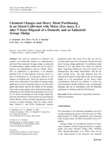Use este identificador para citar ou linkar para este item:
http://www.alice.cnptia.embrapa.br/alice/handle/doc/576685| Título: | Chemical changes and heavy metal partitioning in an oxisol cultivated with maize (Zea mays, L.) after 5 years disposal of a domestic and an industrial sewage sludge. |
| Autoria: | ALCANTARA, S. de  PEREZ, D. V.   ALMEIDA, M. R. A. de   SILVA, G. M. da   POLIDORO, J. C.   BETTIOL, W.   |
| Afiliação: | Instituto de Química - UFRJ; DANIEL VIDAL PEREZ, CNPS; Instituto de Química - UFRJ; Instituto de Química - UFRJ; JOSE CARLOS POLIDORO, CNPS; WAGNER BETTIOL, CNPMA. |
| Ano de publicação: | 2009 |
| Referência: | Water, Air and Soil Pollution, v. 203, n. 1-4, p. 3-16, Oct. 2009. |
| Conteúdo: | The need for solutions to minimize the negative environmental impacts of anthropogenic activities Fhas increased. Sewage sludge is composed of predominantly organic matter and can be used to improve soil characteristics, such as fertility. Therefore, its application in agriculture is an adequate alternative for its final disposal. However, there is a lack of information on its long-term effects on soil changes in tropical areas. Thus, the objectives of this study were to determine (i) the effect of sewage sludge application on heavy metal build-up in soil and maize grains and leaves, and (ii) the effects of soil amendment with sewage sludge on the chemical properties of a Brazilian oxisol. Besides the increasing levels of Zn, Cu, Ni, and Cr, amending soil with sewage sludge also alters the distribution of these metals by increasing the mobile Phases, which correlated significantly with the increase in metal extraction with two single extractants, Mehlich 1 and DTPA (Diethylene triamine pentaacetic acid). The levels of Fe, Mn, Zn, and Cu in maize grains and leaves increased with the type and rate of sewage sludge application. Nevertheless, metal build-up in soil and plants was within the allowed limits. Significant differences were also found in soil characteristics like humic fractionation with the applied sewage doses. The data obtained does not indicate any expressive drawbacks in the use of sewage sludge as a soil amendment, as the heavy metal concentrations observed are unlikely to cause any environmental or health problems, even overestimated loadings, and are in accordance with the Brazilian regulations on farming land biosolid disposal. |
| Palavras-chave: | Lodo de esgoto |
| Tipo do material: | Artigo de periódico |
| Acesso: | openAccess |
| Aparece nas coleções: | Artigo em periódico indexado (CNPMA)  |
Arquivos associados a este item:
| Arquivo | Descrição | Tamanho | Formato | |
|---|---|---|---|---|
| 2009AP15.pdf | 220,46 kB | Adobe PDF |  Visualizar/Abrir |









